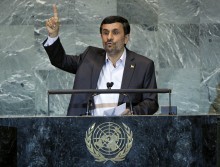The world powers met with Iran this week for yet another round of negotiations seeking a confidence-building deal that can set the stage for a full diplomatic resolution to the Iranian nuclear dispute. Yet again, however, Tehran appears to be stonewalling as no progress was reached.
It’s time for the West to increase sanctions and rhetoric even further against Iran to try and persuade the Islamic Republic to negotiate in good faith. Anything less than that is the equivalent to trying to hit the snooze button on a time bomb.
It’s not like Iran hasn’t had chances. For years it has refused to make any real progress on curbing its nuclear ambitions to ensure its program is strictly peaceful. The round of talks in Moscow earlier this week between the P5+1—the United States, the United Kingdom, France, Russia, China and Germany—is the third round in as many months. And after all that, European Union foreign policy chief Catherine Ashton said there are still “significant gaps” between the sides.
Furthermore, it’s not just the world powers that can’t get Iran to open up. The International Atomic Energy Agency (IAEA) has for months been trying to convince Iran to be more transparent about its nuclear program. A key dispute has been the IAEA’s desire to inspect a military facility in Iran believed to have been used for explosives testing that can be put towards nuclear weapons.
Yet after the head of the IAEA expressed hope an agreement on inspections would be reached and was convinced by Iran the remaining points of contention could be resolved shortly, nothing was achieved in the latest talks earlier this month.
IAEA Deputy Director General Herman Nackaerts, in a statement released by the Agency at the time, said, “There has been no progress and, indeed, Iran raised issues that we have already discussed and added new ones. This is disappointing.”
The way forward for Iran is clear. They must allow facilities and personnel to be reviewed by the IAEA to resolve fears Iran could still be working on the bomb. They also must stop their research-level uranium enrichment, as the P5+1 is demanding.
Such 20 percent enrichment can be used for medical research, as the Iranians are claiming, but their amounts of it exceed that use. Furthermore, it’s a significant step towards the 90 percent enrichment for weapons-grade nuclear fuel.
True, the P5+1 aren’t offering Iran a sweet deal for this compromise: the Iranian Fars News Agency reported it was in exchange for nuclear fuel for Tehran’s medical research reactor and easing up of sanctions on exports of civilian airplane parts. Iran’s not getting a lot here.
But that’s the price to pay to convince the world one’s not on the verge of building nuclear weapons. The only hope for success for the long-term, extensive diplomacy that will be needed to resolve the Iranian nuclear dispute is for Iran to take a full step back in its program. The world must buy more time.
Yet they haven’t, and there’s no time left for the P5+1 to give away. Now, therefore, is the time to ramp up sanctions to maximum impact. It’s time to consider steps against Chinese companies and others who still buy Iranian oil.
It’s time to also send as nasty a message of warmongering as possible. Ironically, it may be the only way to scare Iran enough that a war isn’t necessary.
Sell Israel bunker-buster bombs. Move bombers to US bases in the Middle East. And please stop making it sound as though a war with Iran is the worst possible outcome.
Having the world’s leading sponsor of terrorism acquire nuclear weapons, that’s the worst nightmare. So wake up world, the alarm bells are sounding. There’s no snooze button this time.
(By Joshua Spurlock, www.themideastupdate.com, June 22, 2012)

